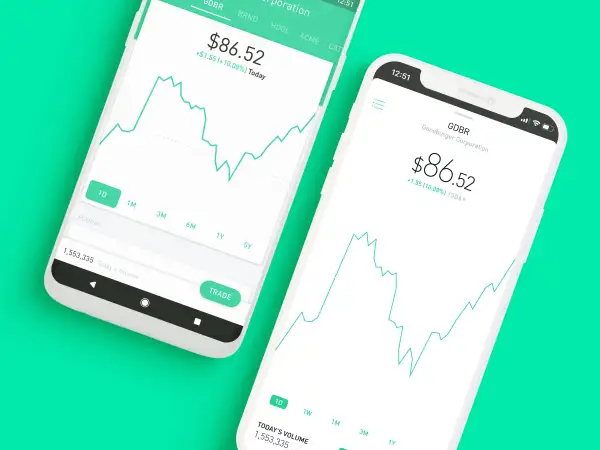This Free Investing App Has Attracted 5 Million Users. Here's Why You Should Stay Away
Money is not a client of any investment adviser featured on this page. The information provided on this page is for educational purposes only and is not intended as investment advice. Money does not offer advisory services.

Robinhood, one of the hottest investing apps on the market, comes with an interesting promise: make money in the stock market without paying a single cent in commissions.
If this sounds too good to be true, well, it probably is.
Robinhood's main audience — young investors with little experience in the market — has driven its success. Its valuation has recently ballooned above $5 billion while its user base is larger than the number of brokerage accounts at E*Trade Financial (the company says it currently has 5 million users).
Yes, it offers some benefits, including ease of use as well as the ability to gain access to certain investments without paying commissions. The app also provides a way to purchase exchange-traded funds (ETFs) — baskets of stocks and bonds that can be the basic buildings blocks of a diversified low-cost portfolio — although you have to dig a bit to find them.
But make no mistake: Robinhood is simply day trading for the mobile era, and its design could actually hurt young investors who don’t recognize the risks. The Robinhood app encourages stock-picking and frequent trading and profits from this behavior.
When asked for comment, a Robinhood spokesperson wrote, “Robinhood’s entire platform offers U.S. stocks, ETFs, options, as well as six different cryptocurrencies, allowing customers to create diverse investment portfolios.”
But unless you’re looking to trade stocks, cryptocurrencies and options — a practice that Money generally doesn't recommend — you should understand Robinhood's major pitfalls.
Robinhood encourages stock-picking, and that’s dangerous
When you sign up for the app, a list of popular stocks appears like Apple, Tesla, Netflix and even well-known cryptocurrencies like Bitcoin appears on your screen. You won't see low-cost, diversified ETFs on that list. In order to invest in a fund, you need to find the fund yourself.
In general, stock-picking isn’t for amateurs. Economists who study the stock market tend to believe short-term stock fluctuations are basically random. Over the longer term, studies have shown most investors have trouble keeping their emotions in check, rushing to buy late in bull markets when prices are high, then selling amid panics when prices are low. In other words, they shoot themselves in the foot.
Over many years — say, while you save for retirement — index funds outperform other strategies because this kind of investment doesn't attempt to time or beat the market, it simply tracks the performance of the total market.
Robinhood’s design could get you to trade more often than you should
When you tap on a stock within Robinhood, you’re given information on how it has performed over time and some stats. If you purchase it, confetti falls. You’ll then receive notifications throughout the day about the stock’s movement. This type of setup promotes frequent trading, says Piyush Tantia, chief innovation officer at Ideas42, a non-profit design firm that utilizes behavior science to tackle social ills.
Tantia hadn’t tried the app before speaking with Money but said generally that users “will choose out of the choice-sets that you give them,” as opposed to doing their own research. He added that certain app settings, such as frequent notifications, encourage users to respond — and, therefore, trade — more often.
Robinhood’s spokesperson said those notifications “are intended to keep investors updated on news, earnings, and price movement, and can be customized or turned off.”
Robinhood’s premium services aren’t worth your time (or money)
One way Robinhood can provide commission-free trades is by making money on the interest from the assets it holds within accounts, a practice that’s not unusual for brokerages. The other way it makes money, though, is through a subscription to gain access to margin (or borrowing money to invest more than you can afford with your own money).
For these subscriptions, you’re essentially paying a monthly fee to borrow money to trade stocks. And if those trades go sour, you could lose your money very quickly.
Robinhood says the subscriptions are only meant for experienced traders, but it seems to be a profitable part of their business.
For the inexperienced, though, use the app to buy that low-cost ETF, and then turn off the notifications and don't check back in except to make sure it’s working correctly every few months.
Better yet, you could just invest via index funds through the much more boring 401(k), IRA, or even in a vanilla brokerage account from Vanguard, Schwab or Fidelity.
A previous version of this post stated incorrectly that you could use the margin subscription service to trade options. Robinhood's premium subscription only allows you to trade stocks on margin. This post has also been updated with new user numbers.
